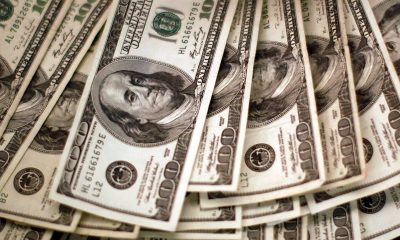Investing
Asia shares edge up, rate hopes face data test

© Reuters. FILE PHOTO: A woman walks past a man examining an electronic board showing Japan’s Nikkei average and stock quotations outside a brokerage, in Tokyo, Japan, March 20, 2023. REUTERS/Androniki Christodoulou/File Photo
By Wayne Cole
SYDNEY (Reuters) – Asian shares started firmer on Monday while gold hit another record high in a busy week for economic data that will test market wagers for early and aggressive rate cuts from major central banks next year.
In particular, the U.S. November payrolls report on Friday needs to be solid enough to support the soft-landing scenario, but not so strong as to threaten the chance of easing. Median forecasts are for payrolls to rise 180,000, keeping unemployment steady at 3.9%.
Many analysts suspect risks are to the upside, with Goldman Sachs tipping 238,000 including a chunk of workers returning from strikes, and a jobless rate of 3.8%.
There was also still a risk the Israel-Hamas war could widen into a broader conflict with three commercial vessels coming under attack in the southern Red Sea.
MSCI’s broadest index of Asia-Pacific shares outside Japan was still up 0.6%, led by gains in South Korea and Australia. dipped 0.4% as the yen extended recent gains.
were flat, after finishing at a 20-month high on Friday, while Nasdaq futures lost 0.2%. The is up 19% for the year so far and just 4% away from its all-time peak.
The latest surge was stoked by wagers the next move by the Federal Reserve will be to cut rates, with Fed Chair Jerome Powell on Friday declining the opportunity to push back hard against aggressive market pricing.
Futures now imply a 71% chance the Fed will ease as soon as March, up from 21% a week ago, and are pricing in around 135 basis points of cuts for all of 2024.
The rusting turnaround in Treasuries has been nothing short of astonishing as two-year yields fell 41 basis points in just a week, the best performance since the mini-crisis in U.S. banks back in March.
Yields on 10-year notes stood at 4.22%, having dropped 29 basis points last week and a long way from the October top of 5.02%.
BULLISH FOR EM
“Our baseline scenario is for a soft landing for the U.S. economy, with positive but below-potential sequential growth for the next six quarters,” said BofA global economist Claudio Irigoyen.
“Starting in June we expect the Fed to start cutting rates by 25bp per quarter until reaching a terminal rate of 3% in 2026,” he added. “Our year-end 2024 U.S. rate forecasts for two- year and 10-year Treasuries are 4.00% and 4.25%, bringing an end to the yield curve inversion.”
Such an outlook should also be positive for emerging markets, with BofA noting returns in the 12 months after the last Fed hike tend to be highly positive with EM equities averaging around 10% and total EM bond returns even higher.
Central bank meetings in Canada and Australia this week are both expected to see rates there unchanged.
The tumble in Treasury yields in turn pulled the rug out from under the dollar, particularly on the yen where it slid 1.8% last week and was last down at 146.47.
Speculation about an eventual unwinding of the Bank of Japan’s super-easy policies has added to the pressure on yen carry trades and could carry the Japanese currency back to its July highs around 138.00.
The euro had also been climbing but suffered a reversal last week when surprisingly soft inflation data led markets to price in a March rate cut from the European Central Bank.
The ever-hawkish Bundesbank President Joachim Nagel pushed back against the doves in an interview over the weekend, but with inflation subsiding so fast markets figure the ECB will have to ease just to stop real rates from rising.
ECB President Christine Lagarde will have her own chance to comment in a speech and Q&A later on Monday.
The dive in yields and the dollar has been a boon for non-yielding gold, which hit a record high around $2,076 an ounce on Monday. [GOL/]
Oil prices have not been so fortunate, amid doubts OPEC+ will be able to maintain planned output cuts. At the same time, U.S. oil production is at record levels above 13 million barrels a day and rig counts are still rising. [O/R]
The attacks on shipping in the Red Sea may provide some support and edged up 63 cents to $79.51 a barrel, while rose 74 cents to $74.81.
Read the full article here

-

 Side Hustles6 days ago
Side Hustles6 days agoMicrosoft Is About to Begin Job Cuts. Here’s Why.
-

 Make Money5 days ago
Make Money5 days ago10 Critical Questions to Ask Your Financial Advisor Now
-

 Make Money4 days ago
Make Money4 days ago10 Ways to Make Money As a Graphic Designer
-

 Investing6 days ago
Investing6 days agoWhat CMOs Need to Know About AI Adoption in Marketing Teams
-

 Investing4 days ago
Investing4 days agoCould Easier Cancellations Build Customer Loyalty?
-

 Investing5 days ago
Investing5 days agoAirbus keeps top spot with 766 jet deliveries in 2024 By Reuters
-

 Personal Finance3 days ago
Personal Finance3 days agoIf you are 60 years old, new 401(k) rules could save you money
-

 Side Hustles6 days ago
Side Hustles6 days agoJPMorgan to Implement a Five-Day Return-to-Office Mandate


















